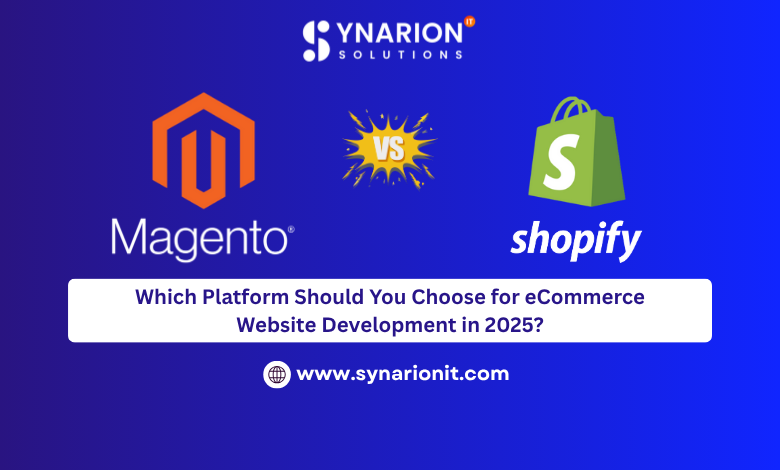Magento vs Shopify: Which Platform Should You Choose for eCommerce Website Development in 2025?
In 2025, the eCommerce landscape continues to evolve rapidly, with businesses seeking robust, scalable, and flexible solutions for their online stores. When it comes to eCommerce website development, two platforms stand out as industry leaders: Magento (now Adobe Commerce) and Shopify. Both offer distinct advantages, but the right choice ultimately depends on your business goals, budget, technical requirements, and scalability needs.
Choosing the right platform is crucial—not only for launching an online store but also for maintaining it effectively as your business grows. Whether you’re a startup or an enterprise-level brand, working with an experienced eCommerce website development company can help you assess these platforms and make an informed decision.
Shopify: User-Friendly and Fast to Market
Shopify is a cloud-based, hosted solution that is known for its simplicity and ease of use. It allows businesses to get online quickly without the need for advanced technical knowledge. As of 2025, Shopify has continued to evolve, offering improved features, better integrations, and stronger support for omnichannel selling.
Why Choose Shopify?
- Ease of Use: Shopify’s intuitive interface is ideal for non-technical users. Everything from adding products to processing payments can be managed with just a few clicks.
- Speed to Market: If you’re looking to launch quickly, Shopify can get you up and running in days, making it ideal for startups and small to mid-sized businesses.
- Integrated Hosting and Security: As a hosted platform, Shopify takes care of server maintenance, security updates, and hosting. This can save time and reduce the technical burden on your team.
- Scalable Plans: Shopify offers a range of pricing plans, including Shopify Plus for larger enterprises. As your business grows, the platform can scale accordingly.
- App Ecosystem: With thousands of apps and plugins, Shopify enables users to extend store functionality easily, covering everything from SEO and email marketing to inventory management.
- 24/7 Support: Shopify provides reliable customer support, which is particularly helpful for businesses without a dedicated IT department.
Magento: Power and Customization for Advanced Needs
Magento, rebranded as Adobe Commerce, is a powerful open-source platform known for its flexibility and depth. It’s a preferred choice for businesses with complex requirements or those looking to create a fully customized shopping experience. While Magento demands more technical expertise, it offers unmatched control and customization.
Why Choose Magento in 2025?
- Flexibility and Customization: Magento allows for extensive customization of both front-end and back-end experiences. This makes it ideal for businesses that need tailored functionality or unique user experiences.
- Advanced Features: Magento supports advanced product types, multi-language capabilities, multiple storefronts, and deep integration options—features that make it a top pick for enterprises and international brands.
- Scalability: Magento is built for scale. It can handle thousands of products and large volumes of traffic, making it suitable for high-growth businesses or established brands with large catalogs.
- Open-Source Freedom: With access to the source code, developers have full control over the platform, which allows for greater innovation and unique custom solutions.
- Robust Community and Partner Network: Magento has a vast community of developers, extension providers, and certified partners. A reliable eCommerce website development company with Magento expertise can build, maintain, and optimize your store according to best practices.
- Enhanced Security: With Adobe Commerce, enterprises benefit from dedicated security features, compliance options, and regular updates tailored to meet stringent business requirements.
Key Considerations for Your Business
When deciding between Shopify and Magento for your eCommerce website development, consider the following:
- Budget: Shopify has predictable monthly costs, including hosting. Magento, especially the Adobe Commerce Cloud version, can have higher initial development and maintenance costs but may offer better ROI for large-scale operations.
- Technical Expertise: Shopify is ideal for users with limited technical skills. Magento, however, often requires a team of developers or a specialized eCommerce website development company to build and maintain.
- Time to Launch: Shopify’s ready-to-use nature can get your store online quickly. Magento projects often take more time due to the customization involved.
- Business Model and Scale: Smaller businesses or D2C brands may benefit from Shopify’s simplicity, while B2B or enterprise companies might prefer Magento’s flexibility and robust infrastructure.
- Long-Term Vision: If you foresee a need for extensive customization, multiple storefronts, or integrations with ERP or CRM systems, Magento might be more suitable in the long run.
The Role of an eCommerce Website Development Company
Choosing between Magento and Shopify is a strategic decision that impacts the future of your online business. A professional eCommerce website development company can provide valuable insights based on your current needs, growth plans, and industry best practices. These experts can assess your goals, recommend the right platform, and handle implementation, integration, and ongoing support.
In 2025, the competition in online retail is fiercer than ever. Businesses that invest in the right technology and development partner stand a better chance of delivering exceptional customer experiences, improving operational efficiency, and driving long-term growth.
Final Thoughts
Both Magento and Shopify are powerful platforms for eCommerce website development, but they serve different types of businesses. Shopify is best suited for those who value simplicity, speed, and lower upfront costs, while Magento is ideal for businesses that demand scalability, customization, and robust infrastructure.
Before making a decision, consider working with a trusted eCommerce website development company that understands the nuances of both platforms and can align technology with your business strategy. In the dynamic eCommerce environment of 2025, the right platform is more than a technical choice—it’s a strategic asset.

